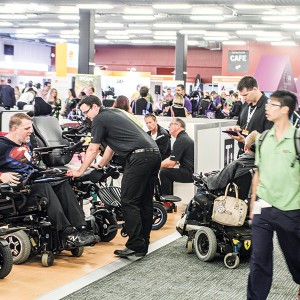
A veritable ‘who’s who?’ of speakers from around the world will be at the 2016 ATSA independent Living Expo. These specialists in their field will gather to inform mainstream allied health practitioners about the latest research and potential solutions relevant to disability stakeholders. New evidence on pressure ulcer etiology to the benefits of natural materials in controlling skin microclimate, are just two of the 40 clinical programs being presented at ATSA, Australia’s number one event for the disability sector that goes to Melbourne in May.
“Often health professionals don’t get exposed to the latest information and research so the ATSA Expo is the perfect opportunity for them get up-to-date on a whole range of issues they may not hear about otherwise,” ATSA executive director Chris Sparks, told F2L. ATSA is also a golden opportunity for allied health practitioners to get continuing CPD points, Sparks said.
He said this year’s event has attracted one of our biggest line-ups of guest speakers from overseas “which says a lot about the reputation of the event.” Among the speakers are Darren Hammond, a leading expert on wound and pressure care from the USA and Dr Barend ter Haar (pictured) from the UK, who is an authority on tissue integrity. Local speakers include ARATAs Natasha Leighton who will discuss sourcing of assistive technologies and ATSA regular, Narelle Higson, one of the few practitioners specialising in sexuality. Malcolm Turnbull from Permobil will reflect on 30 years of being a wheelchair user and his work and travel experiences in Europe, Asia and the USA.
Another timely session, given the full roll out of the NDIS in Victoria and NSW will only be a few weeks away is: Are you NDIS ready?: the challenging marriage of therapy and fee-for-service. As Sparks sees it, the NDIS is a whole new ball game as previously all therapy services that have been funded externally will now need to be provided as a fee for service, which, he said, is something practicing therapists have to start thinking about. “The NDIS is a massive social change that will shake up every level of the disability sector, including ours, however it will create tremendous opportunities and it will be interesting to see how allied health practitioners and business adapt to these changes.”
As for those sometimes confusing press reports about the NDIS, Sparks is blunt as he believes the Turnbull Government has done a poor job explaining why the NDIS is not a welfare measure but an investment in social change. “What has not been made clear is that if we had continued with the current way of funding for disability services, by 2020 the costs would be far greater than the NDIS.” Disability employment is another area offering significant cost savings. “Because Australia ranks very poorly among OECD countries when it comes to employment rates for people with disability if we can only hit the average, not the excellent, the net benefit to the budget will be $30 billion.”
He described the NDIS as an act of social engineering which, when done properly will deliver Australia wide benefits and will not become another taxpayer expense. Sparks said there has been a lot of publicity about the sometimes easy access to the Disability Support Pension but it was a different scenario when it comes to the NIDIS “the chance of anyone getting on the NDIS who is not entitled to it is near impossible. The NDIS does not provide income support, it won’t fund a salary but what it will do is fund items like home care, wheelchairs and home modifications which take the burden off the person with disability and delivers benefits that will makes it easier for them to work or live at home. It is a win-win situation all round.”
The ATSA Independent Living Expo will be held at the Melbourne Showground May 18-19, 2016.
For more information and to register visit: www.atsaindependentlivingexpo.com.au
